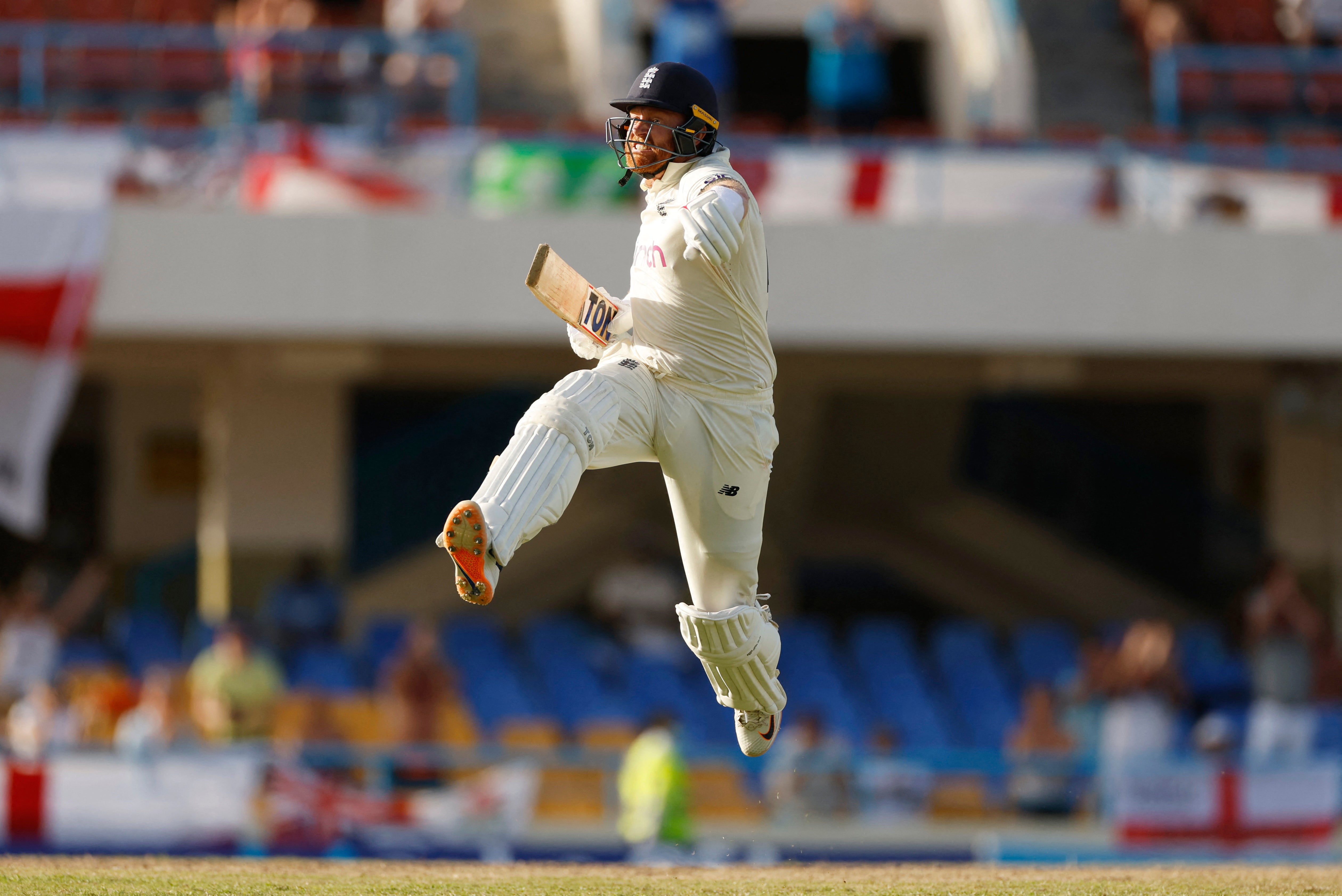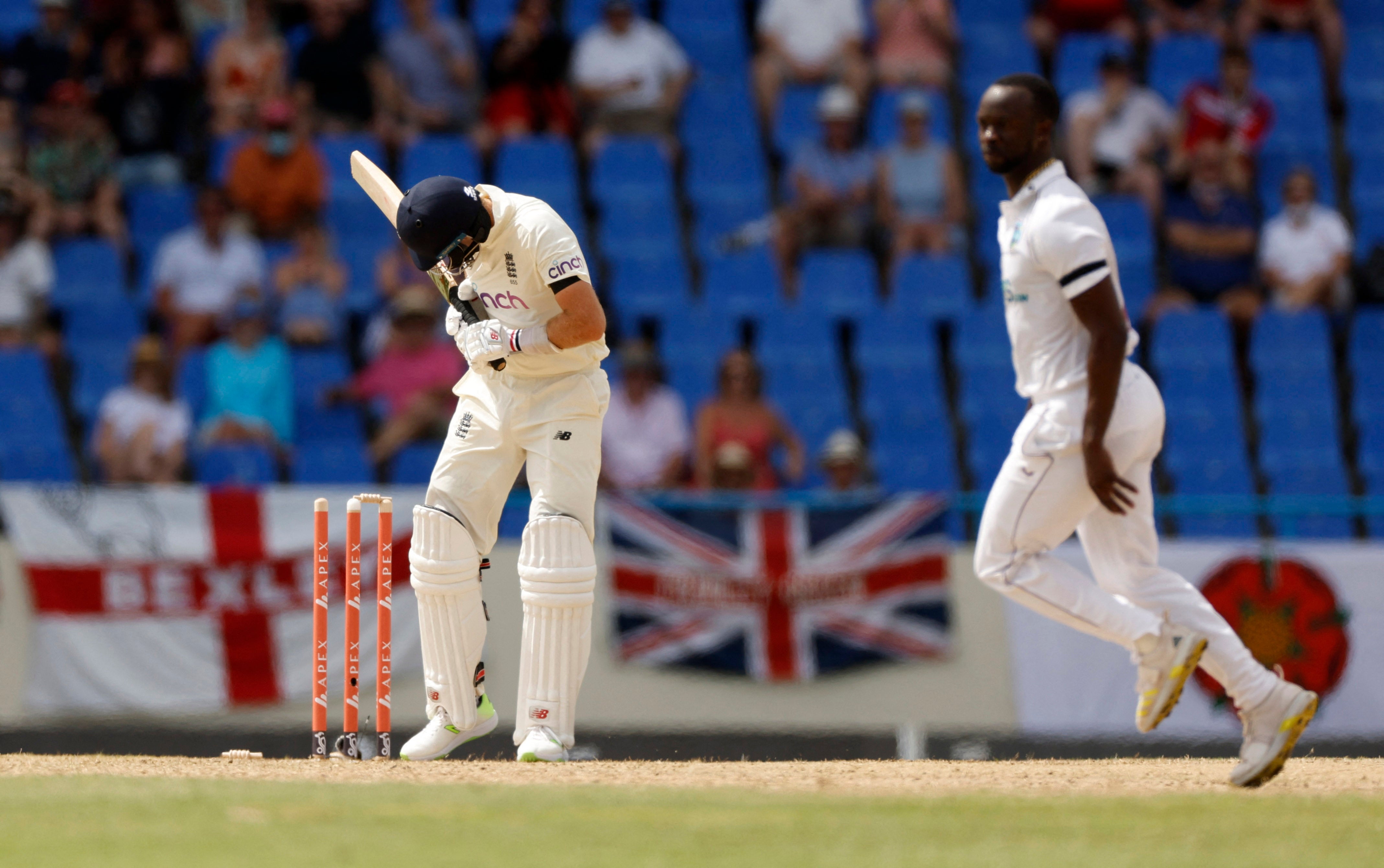Measured then malicious Jonny Bairstow gives England’s ‘Red Ball Reset’ hope against West Indies
Bairstow was unbeaten on 109 at the end of day one in Antigua after England had earlier slipped to 48-4

Your support helps us to tell the story
From reproductive rights to climate change to Big Tech, The Independent is on the ground when the story is developing. Whether it's investigating the financials of Elon Musk's pro-Trump PAC or producing our latest documentary, 'The A Word', which shines a light on the American women fighting for reproductive rights, we know how important it is to parse out the facts from the messaging.
At such a critical moment in US history, we need reporters on the ground. Your donation allows us to keep sending journalists to speak to both sides of the story.
The Independent is trusted by Americans across the entire political spectrum. And unlike many other quality news outlets, we choose not to lock Americans out of our reporting and analysis with paywalls. We believe quality journalism should be available to everyone, paid for by those who can afford it.
Your support makes all the difference.The Red Ball Reset was never going to produce immediate results. And as England squared off against West Indies in the first Test of what they hoped would be the start of a long upward curve, the assertion that things might get worse before they get better played out in a perfect microcosm across the 86 overs of this first day in Antigua.
Having stumbled to 48-4, England battled through to make it to stumps on a much healthier 268-6 thanks to a measured then malicious innings of 109 from Jonny Bairstow. He remains unbeaten, as does the optimism for better times that was being severely challenged at 10:30am local time.
The leadership casualties and the eight changes made to the squad following the 4-0 Ashes defeat was merely the equivalent to switching your wireless router on and off again as far as reboots go. But the circuitry is still buggered, and it’ll be a while until the full-time engineers are on-site to do anything worthwhile about it. Yet in Bairstow and Ben Foakes, there was something Bluey and something new(ish) to suggest this next passage in English cricket may not be as harsh.
Off the back of a winter in Australia in which England failed to make 300, they were the two batters to emerge with any credit. Bairstow by virtue of registering the only century of the tour, as well as being insulated from the brunt of the criticism given he only played two of the five matches. Foakes by, well, not being there at all, as Jos Buttler struggled in front of and behind the stumps.
Test century number eight was typically Bairstow. Anything short and wide was carved through the off side. Anything short and straight was thumped through leg. And those fuller at the stumps defended or clipped through straight midwicket, which is becoming an area he is more comfortable accessing, the result of a broader technical reconfiguration.
The moments of alarm came and went: an early hooked top edge, a speculative LBW review on 45, given out caught behind erroneously off left-arm spinner Veerasammy Permaul and even a run out at the non-striker’s end on 95 when Chris Woakes drove into the opposite stumps via the fingertips of Alzarri Joseph.
By the time he had swept his 190th delivery to reach three figures, the beaming smile told its own story. Of comfort once more at Test level, with centuries in back-to-back matches. Of a key rescue act capped off with jubilation having come to the crease with England in strife. This was the slowest of his previous jaunts to three figures, though it did not feel particularly docile at the back end.
The real thrust of his knock came in the evening during a sequence of seven scoring shots in a row, all boundaries, to take him from 60 to 88. It was a proactiveness matched at the other end in a partnership of 99 with Foakes, who looked to be making up for lost time in Antigua, a year on from the last of his eight caps in Ahmedabad. It might have only been 42 (the next highest after Bairstow’s knock, to be fair) before he was trapped in front by Jason Holder, but there was enough style, hurry and “told you so” to underline why he is owed a clearer immediate run.

Of course, their work mattered that little more given the start. As familiar as it was to see the top four gone within 16 overs - after Joe Root had won the toss and elected to bat, no less - the West Indies attack deserve great credit for salting still fresh wounds.
Kemar Roach set-up debutant Alex Lees nicely, with movement away from the left-hander from around the wicket before getting one to curve in and straighten from a similar length to trap him leg before. A review called by the batter showed impact with the front pad to be marginally enough outside the line of off stump to stay with the umpire’s onfield call, and served as a lesson to Lees of the tight margins at this level.
Zak Crawley followed, a loose booming drive offering a thick inside edge that was taken smartly with an instinctive left hand by wicketkeeper Joshua da Silva, who shifted left after moving right, giving Jayden Seales his first. Joe Root’s nth return to number three lasted just 14 deliveries, offering no shot to allow Roach to clip the top of his off stump just one ball after guiding him through the hands of Jermaine Blackwood at third slip for 13. The number four spot, still warm from Root’s 1,744 runs since the start of 2021, was occupied by Dan Lawrence, who looked confident for 20 before Holder dragged him wider to force an edge into the cordon, where Blackwood made amends for his earlier mistake.

Holder’s pre-lunch work of five overs - all maidens - was testament to the early control of the hosts, which kept the pugnacious duo of Ben Stokes and Bairstow under wraps. Their approach after the break on 57-4 was always likely to be proactive to a point given the number of times they have shared crease time together. Singles were almost telepathic and, as the ball got a little older and the bowlers a little tired - and thus, more wayward - boundaries, particularly off short deliveries, were picked off.
A brace of fours from Stokes - one pumped through midwicket, the other tickled around the corner - took the all-rounder to 36 and the partnership to 67 in an over that began with a missed catch. A toe edge from Stokes passed Holder at second slip, much to the bemusement of Seales, the bowler. But the 20-year-old left the over with Stokes in his back pocket, fizzing in a full delivery that moved enough to catch the Englishman’s inside edge onto leg stump.
Mercifully for the tourists, that was to be the only wicket of a middle session they could claim as their own, and the brisk 21 from Foakes offered the promise of a fruitful finale, especially the full-face timing down the ground that featured in his fours boundaries up to tea. Bairstow, meanwhile, was playing possum on 35.
Thankfully for England, that promise was kept: 123 runs flowed, as did the milestones. Bairstow’s own century was supplemented by involvement in a third fifty stand of the day alongside Chris Woakes (24 not out) as the pair saw off 5.5 overs of the second new ball with relative comfort.
The average first innings score in Antigua is 336, which is still 68 runs away. England are by no means that far ahead, and West Indies certainly not in strife despite losing impetus as the day wore on. But after a chastening start, England will be as happy as they have been this winter.




Join our commenting forum
Join thought-provoking conversations, follow other Independent readers and see their replies
Comments